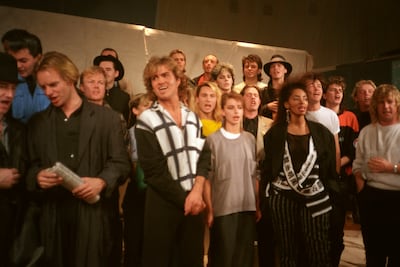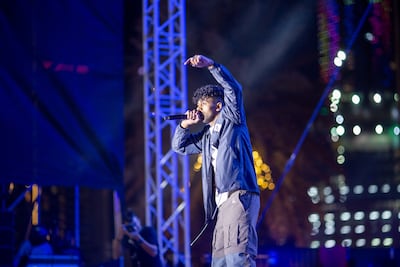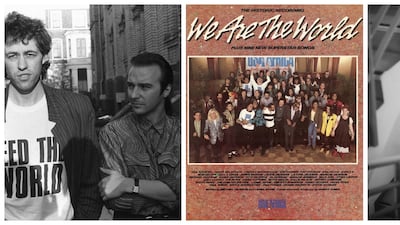The release of a new Netflix documentary, The Greatest Night in Pop, shines the spotlight on one of the most famous collaborations in music history: the recording of the 1985 charity single We Are The World.
Written by Michael Jackson and Lionel Richie and produced by Quincy Jones, the song, which was released on March 7, 1985, sold more than 20 million copies and brought together some of the biggest names in music as the supergroup USA For Africa to raise money for famine relief on the continent.
The idea came from music legend Harry Belafonte, who Richie says “made it all come together” during a 3am phone call to the All Night Long singer.
The result was 46 of the most famous singers and songwriters in the world, including Bob Dylan, Bruce Springsteen, Stevie Wonder, Cyndi Lauper, Paul Simon, Ray Charles, Tina Turner, Billy Joel and Diana Ross, heading to the studio to be greeted by a sign that read: “Check your egos at the door.”
“[My manager Ken] Kragen decided, well, everyone’s going to be in town for the American Music Awards. That’s the perfect place to have everybody do it,” Richie told The Hollywood Reporter of arranging the recording. “All we kept hearing was, ‘Well, we’re adding more people.'”
The documentary by Vietnamese-American filmmaker Bao Nguyen has received critical acclaim and plenty of nostalgia, particularly from one of the song’s main architects.
“What made We Are the World so fantastic was we snuck up on the world,” Richie told The Hollywood Reporter. “It came out fast. You could surprise somebody. It was a movement. I use We Are the World as my example of the end of my innocence, because from that point on, the world became too hip.”
How a Beatle’s song put Bangladesh disaster on the world's stage
While there had been smaller, country-specific charity songs before, The Beatles’ guitarist George Harrison is credited with recording the first international charity single.
In 1971, after being told of the plight of millions of refugees fleeing Bangladesh (known as East Pakistan at the time) by his friend, the famed Indian-Bengali musician Ravi Shankar, Harrison released the single Bangla Desh to raise money and awareness of the situation.
The twin blows of the 1970 Bhola cyclone, which killed more than 300,000 people and is still the deadliest tropical cyclone recorded, and the outbreak of the Bangladesh Liberation War, combined to create a major humanitarian disaster.
“I got tired of people saying: ‘But what can I do?’” Harrison wrote in his autobiography I Me Mine. “Also, the reluctance of the press to report the full details created the need to bring attention to it. So, the song Bangla Desh was written specifically to get attention to the war.”
The song was a top 10 hit in the UK and reached number 23 on the Billboard Hot 100 in the USA.
Harrison followed up with the Unicef-backed Concert for Bangladesh at New York’s Madison Square Garden on August 1, 1971, which also featured Eric Clapton, Ravi Shankar, Bob Dylan and Ringo Starr.
The concert was held with the aim of raising money for the Bangladeshi people and awareness of the work being carried out by Unicef.
In 2005, the UN secretary general at the time, Kofi Annan, said the song's success contributed to bringing the Bangladesh crisis to an international audience.
Do They Know it’s Christmas? revolutionises the charity single

Performances by Abba and the Bee Gees at the Music for Unicef Concert in New York in January 1979, led to their songs Chiquitita and Too Much Heaven become charity singles, after Abba donated 50 per cent of royalties to Unicef, an arrangement still in effect today. The Bee Gees also donated a percentage.
But it was the charity single Do They Know It's Christmas?, released in November 1984 and performed by the supergroup Band Aid, that revolutionised what a charity single could do on a global scale.
Written by Bob Geldof and Midge Ure to raise money and awareness for the famine in Ethiopia, the pair brought in George Michael, Bono, Phil Collins, Bananarama, Boy George, Spandau Ballet, Duran Duran, Paul Weller and others to record the song in one day at Sarm West Studios in Notting Hill, West London.
The song raised £8 million ($10.13 million) in its first year (more than £30 million today), and to date has raised more than £200 million for The Band Aid Charitable Trust, which administers it.
The track also inspired the Live Aid concerts on July 13, 1985 at Wembley Stadium in London, John F Kennedy Stadium in Philadelphia, while more concerts were held in countries including the Soviet Union, Australia and Japan.
The song was re-released in 1989, 2004 and 2014, respectively, by Band Aid II, featuring Bros, Kylie Minogue and Chris Rea; Band Aid 20, which featured Chris Martin, Snow Patrol and Joss Stone, and Band Aid 30, which included Ellie Goulding, One Direction and Ed Sheeran.
Says Geldof: "The song has a life of its own. It raises money every time it’s played.”
Rajieen unites Arab artists for Palestine

Since Do They Know it’s Christmas? and We Are The World, charity singles have tended to stay within the borders of their country of origin, with a few notable exceptions.
The 1985 cover version of That’s What Friends Are For featuring Dionne Warwick, Elton John and Stevie Wonder raised money for the American Foundation for Aids Research and reached number one in the US and UK.
George Michael and Elton John’s 1991 duet Don’t Let The Sun Go Down On Me, which benefited 10 charities, also reached the top spot in the UK and US.
Headline-making disasters including the 9/11 attacks in 2001, the Indian Ocean earthquake and tsunami in 2004, Hurricane Katrina in 2005 and the Haiti earthquake in 2010 have all inspired charity singles to raise money to assist survivors and rebuild infrastructure.
In the UK, charity singles are a popular part of the music landscape. Charities such as Children in Need and Comic Relief continue to release singles to raise money and awareness of their televised events.
Comic Relief pairs British comedians and actors with well-known bands for charity singles. These include a cover of The Beatles’ Help in 1989 by British comedians Jennifer Saunders, Dawn French and Kathy Burke with Bananarama, which reached number three in the UK charts.
Absolutely Fabulous by the Pet Shop Boys was released in 1994 and featured Joanna Lumley and Jennifer Saunders in character as Patsy and Eddie from the hit television show.
Disasters have also inspired creative communities to come together to raise money for those affected. These include the Herald of Free Enterprise ferry disaster at Zeebrugge in March 1987 and the Hillsborough football stadium disaster in England in April 1989, which inspired covers of The Beatles’ Let It Be by Ferry Aid, and Ferry Cross The Mersey by Gerry and the Pacemakers.
More recently, the war in Palestine has galvanised artists in the Arab world to come together and make music to raise money for relief efforts.
Two of the Arab world’s biggest hip-hop stars, Afroto and Marwan Pablo from Egypt, as well as Jordanian singer Issam Alnajjar, Syrian singer-songwriter Ghaliaa Chaker and Tunisian singer Balti, provided vocals for the track's powerful lyrics.
“Rajieen is a powerful and uncompromising composition that serves as a testament to music's transformative potential to ignite change and capture the world's gaze amid urgent global concerns,” a statement said.

